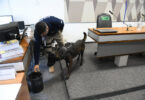Em quase todas as formas de turismo e viagens, é necessário que haja um controle de gerenciamento de multidões. Qualquer um que tenha assistido a enorme multidão na Times Square em Nova York durante a celebração da véspera de ano novo notou.
As praias também são locais onde há necessidade da gestão de multidões.
Assim, entendemos que nem todo gerenciamento de controle de multidões precisa ser para festividades.
Por exemplo, há gestão de multidões religiosas como na Praça de São Pedro em Roma, durante o Hajj em Meca ou ao longo do rio Ganges, na Índia. Há também gestão da multidão política, como em um comício político, convenção ou manifestação.
Nem toda a administração de multidões passa por mega eventos como a véspera de Ano Novo em Nova York, ou o Hajj em Meca. Existem outras formas de gestão de multidões, que, embora em menor escala, também precisam ser gerenciadas. A simples espera nas filas nos aeroportos, em parques, em estádios e eventos esportivos há uma necessidade em gerenciar filas, assim como os próprios eventos dentro do estádio.
Na realidade, nem todas as multidões são iguais. Multidões tendem a formar múltiplos tipos com diferentes características de grupo. Por exemplo, nos concertos e eventos ao ar livre podem atrair multidões. Eventos universitários e as festas também atraem multidões, mas o comportamento da plateia é muito diferente.
Estudiosos que estudam multidões os dividem por múltiplos tipos. Por exemplo, as multidões podem ser homogêneas, como multidões religiosas ou políticas, ou heterogêneo, como multidões em uma rua movimentada.
As multidões podem ser pré-planejadas ou podem formar espontaneamente grupos, eles podem ficar contidos ou amedrontados e em seguida, rapidamente se transformar em um tumulto ou multidão descontrolada.
Algumas multidões tendem a ser amigáveis e dispostas a trabalhar com as autoridades, enquanto outros prosperam em não fazer o que é solicitado a eles. As multidões podem ter um objetivo pré definido, por exemplo, buscando derrubar um partido político ou podem se juntar com o simples propósito de se divertir, como em um time de celebração da vitória do seu time. Não importa que tipo de multidões o turismo da sua região atrai, saber gerir multidões é essencial. Uma boa gestão de multidões pode resultar no sucesso do evento e se tornar uma atração por si só.
A ineficiente gestão de multidões pode se transformar em um motim resultando e não só causar perdas materiais, mas até mesmo de vidas. Essa falta de controle pode resultar em problemas adicionais e de má publicidade.
Para ajudar você a
considerar o tipo certo de gestão de multidão para a sua entidade de turismo,
Turismo Tidbits apresenta as seguintes sugestões.
-Análises de gerenciamento de risco são essenciais. Nunca planeje um evento onde haverá uma multidão formado-se (no interior ou exterior) sem uma avaliação completa da situação. Isso significa que você precisa saber os números e tipos de pessoas que você espere estar lá, possibilitando fazer um gerenciamento e análise de risco em profundidade. Por exemplo, a multidão está se formando durante as horas do dia ou a noite? Se o evento for um evento noturno, haverá ser iluminação adequada?
-Lembre-se se você não pode controlar a multidão, você deveria cancelar o evento. Sempre haverá algum risco, mas alguns eventos simplesmente não poderiam ser feitos sem segurança. Se você não puder garantir a segurança dos participantes, então você melhor cancelar o evento.
– Esteja preparado e tenha primeiros socorros. Principalmente se o evento envolver bebidas alcoólicas. Quanto mais álcool, maior a chance de embriaguez. Quanto mais densa a multidão, mais provável é que haja uma emergência médica. Suas equipes médicas podem sobrepor uma multidão?
Salvar uma vida? Quão bem protegida é a equipe médica?Você tem ambulâncias e médicos suficientes (enfermeiras) de plantão? Existe um plano de evacuação médica e este plano funcionará sob todas as condições?
Entenda o que é “multidão esmagada”. Quanto maior a densidade de uma multidão, maior é o potencial para problemas. Quando as pessoas estão juntas, elas tendem a sentir encurraladas. Quando a população vai além de 7 pessoas por metro quadrado, o potencial para problemas aumenta
exponencialmente.
Há um potencial maior para que surjam problemas
quando as pessoas estão se movendo em direção a algo que elas querem. Esse movimento é chamado de “insanidade coletiva”. Durante um momento desses é tão provável que as pessoas morram pisoteadas sem se dar conta do que está acontecendo. A multidão pode esmagar e depois dispersar. Uma maneira de diminuir esse problema é ter “válvulas de escape”, onde a multidão tenha uma
densidade menor.
Se o evento tenderá atrair substâncias ilegais deve existir um plano de gerenciamento de substâncias!
Considere o seguinte:
• Certifique-se de identificar todos os riscos apresentados por essas substâncias que podem vir a ser usadas no evento;
• Liste suas estratégias e ações para reduzir e / ou
eliminar esses riscos;
• Você está claro sobre quem é responsável pela implementação dessas estratégias e quem é seu pessoal de backup?
Você tem segurança privada trabalhando de acordo o a legislação? Eles podem se comunicar com uma central de comando? Então pergunte a si mesmo: você listou todos os riscos (incluindo garrafas e recipientes de bebidas que poderão se tornar armas) que estarão presentes neste evento?
Saiba quais são os riscos de cada substância e divida-os em riscos em subconjuntos. Muitas vezes a tarefa parece esmagadora.
Neste caso, divida a tarefa em pequenas unidades. Por exemplo:
Se o problema de beber em excesso ou de jovens
contrabandeando substâncias ilegais para a multidão? Que metodologias você usará para diminuir o risco? A simples verificação de bolsas funcionará ou há uma maneira de eliminar as pessoas que têm um potencial paratornarem-se violentas?
-Aprenda com os erros do passado e tente evitar repeti-los. Por exemplo, é melhor ter muitos
do que poucos oficiais no evento. Seja claro que
entradas e saídas estão claramente controladas, não deixe de anunciar amplamente o que não será tolerado. Lembre-se disso, multidões significam anonimato o que permite que certas pessoas façam
o que eles temem fazer quando não estão misturadas à multidão.







